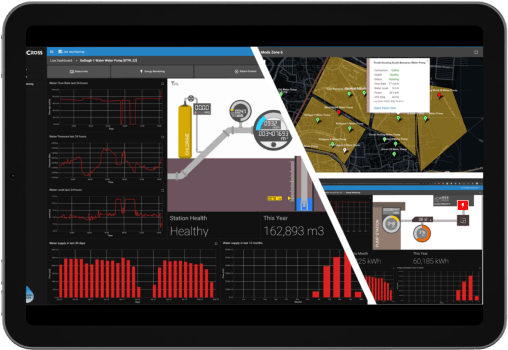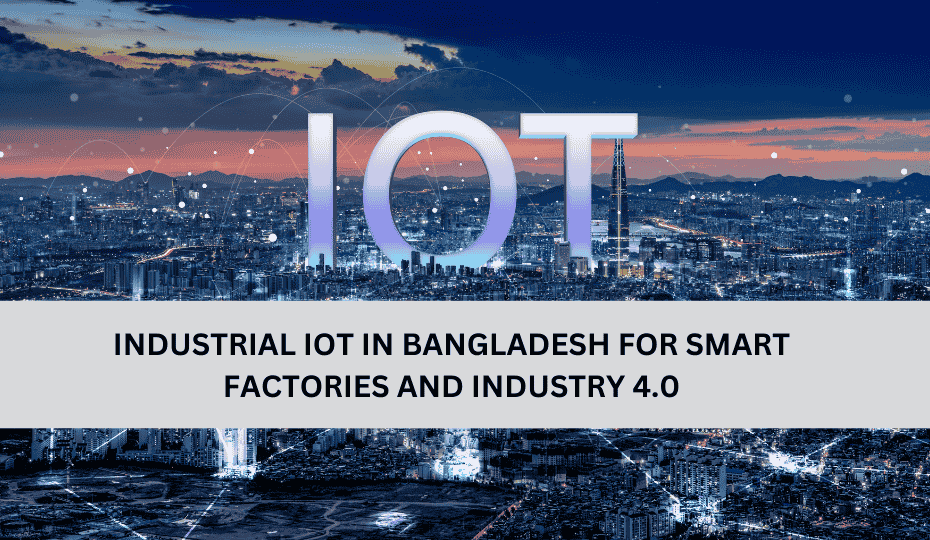Bangladesh, as a developing nation, aims to become a manufacturing hub. Industrial digitization now enables most sectors to utilize more advanced processes. Industries are integrating IIoT, automation, AI, big data, and predictive analytics into their production processes to adapt to Industry 4.0. The demand for Industrial IoT in Bangladesh is rising as industries continue to expand.
Society clearly urges Bangladesh to adopt Industry 4.0 with advanced manufacturing methods. Automation is notable, especially in the textile, apparel, pharmaceutical, and food processing sectors, where digital technologies enhance production, reduce waste, and improve product quality.
What is Industrial IoT?
The term “Industrial IoT” (IIoT) refers to using networked devices, sensors, and data analytics to gather and act on construction data in real-time. This technology helps constructors monitor tools, improve production, predict maintenance, enhance safety, and reduce costs.
Industrial IoT in Bangladesh
In Bangladesh, Industrial IoT is rapidly advancing in textiles, garments, food processing, pharmaceuticals, and water treatment. With rising pressure to cut costs, improve efficiency, and meet global standards, these sectors increasingly need IIoT technologies.
There are several reasons that justify the increasing scope of Industrial IoT in Bangladesh:
Demand for Higher Productivity: With the rise of competition, industries are exploring ways to enhance their production systems. Such practices involve the use of data analytics and engineering information for machine-to-machine technology, which increases productivity and reduces costs.
Economic Policies: The government of Bangladesh is encouraging the development of different initiatives that promote the industrialization of the country. For this reason, policies aimed at motivating the use of the Industry 4.0, refocused on charter’s education, are being implemented. This has resulted in enhanced creation and adoption of the IIOT.
Ease of Work: Industries are now leveraging IIOT technologies along with connection to reduce physical work, enhance speed and accuracy of work as well as increase volume of production. This has been aided by the increase in the use of PLC automation and SCADA systems around the country.
Energy Management and sustainability: Systems for energy management of industries based on IoT technology have made it possible for the industries to monitor their energy usage and cut it down as much as possible. This enhances efficient operations and contributes to the global quest for sustainability.
Syncross: Smart IIoT Solutions in Bangladesh
In Bangladesh, Syncross is making a great impact on the enhancement of smart factories through incorporating advanced IIoT technology in manufacturing environments. Prominent Bangladeshi factories such as BAT Bangladesh, Syngenta Bangladesh, Abul Khair Ceramics, Continental Garments, and Unilever have implemented Syncros IIoT. Using the Syncross IoT platform, businesses are able to deploy energy efficient measures, automate key processes with full capacity lest any human involvement and look after the operation of machines in real time. Such business strategies yield lower operational costs, greater output and improved security.

In the following bulleted points, the major advantages of the Syncross IIoT platform are listed concisely:
Real-time monitoring: Understanding fully the performance of machines and the processes of production at all times.
Predictive maintenance: Predict failures of parts and machines in advance, hence minimizing the cost and time incurred in repairs.
Energy management: Control energy consumption to reduce costs and enhance efficiency in operations.
Increased productivity: Data centricity enhances production processes by eliminating waste.
Seamless integration: Integration with legacy systems such as SCADA and PLC automation is fast and uncomplicated.
IoT-based equipment management: A central unit controls and oversees all industrial devices.
Smart utilities monitoring: Controls and manages consumption of water, power and gas.
Advanced data analytics: Real time analysis and reporting giving useful insights.
Remote monitoring: Ways for the operators to influence the systems and machines regardless of their location.
Scalability: Scales up with the business requirements, accommodating growth and industrial automation in the years to come.
Conclusion:
The rise of Industrial IoT in Bangladesh marks a critical shift in how industries operate, manage, and grow. IIoT technologies enable real-time monitoring, predictive maintenance, and increased automation, equipping businesses to better meet the challenges of today’s competitive marketplace. Platforms like Syncross are at the forefront of this transformation, providing the tools necessary to make smart factories a reality and lead Bangladesh into the future of Industry 4.0.
By embracing Industrial iot in bangladesh are not only enhancing their productivity and efficiency but also positioning themselves for long-term success in an increasingly digital world.

